
Angélica Camacho
Angelica Camacho is an Assistant Professor in the Department of Criminal Justice Studies at San Francisco State University. Her current research documents the 2011 and 2013 Pelican Bay California Prisoner Hunger Strikes and the subsequent uprising of their families. She engages and forefronts SHU prisoners and their families’ theorization about social transformation and the carceral state. Camacho examines the ways prisoners have used their bodies, spirit, and mental strength against the prison apparatus to resist the conditions of confinement in Security Housing Units (SHU). Additionally, she analyzes how people have become anesthetized to the brutality of solitary confinement and points to the rise of moral panics around the Mexican Mafia. Camacho simultaneously explores how the War on Drugs, Gangs, and the criminalization of Latinx communities contributed to the rise of the prison industrial complex in California.
Camacho is active with the Mandela Campaign and California Families to Abolish/Against Solitary Confinement (CFASC) in the struggle to end long-term solitary confinement. She is also a previous Career Enhancement Mellon and Ford Foundation fellow.
Ph.D. Ethnic Studies, University of California, Riverside, 2017
M.A. Ethnic Studies, University of California, Riverside, 2013
B.A. Chicano/a Studies, University of California, Santa Barbara, 2010
B.A. Black Studies, University of California, Santa Barbara, 2010
“The Moral Panic of the Mafioso: The Rise of the Prison Industrial Complex and the Attack on Brown Communities.” Latino Studies 21, 4 (2023): 541-565.
“Unbroken Spirit: California SHU Prisoner Hunger Strikes and the Promise of Rebirth.” Kalfou 10, 2 (2023): 165-192.
“Abolition as a Verb.” Social Justice: A Journal of Crime, Conflict, & World Order 49, 4 (2024): 93-121.
Critical Prison Studies, Chicana/o/x Latina/o/x Studies, Cultural Studies, Black and Brown Criminalization, War on Gangs, War on Drugs, US/Mex Border, Racial State Violence, Community Wellness and Regeneration, Prayer and Spirituality, Grassroots Social Movements, Zapatismo, Activist-Scholarship, Community Based Research, Indigenous and Feminist Research Methods and Methodologies
CJ 200 Construction of Crime and Justice
C J 330GW Research Methods in Criminal Justice – GWAR
CJ 450 Jails and Prisons
CJ 452/SOC 451 Criminological Theory
CJ 680 Field Course in Criminal Justice